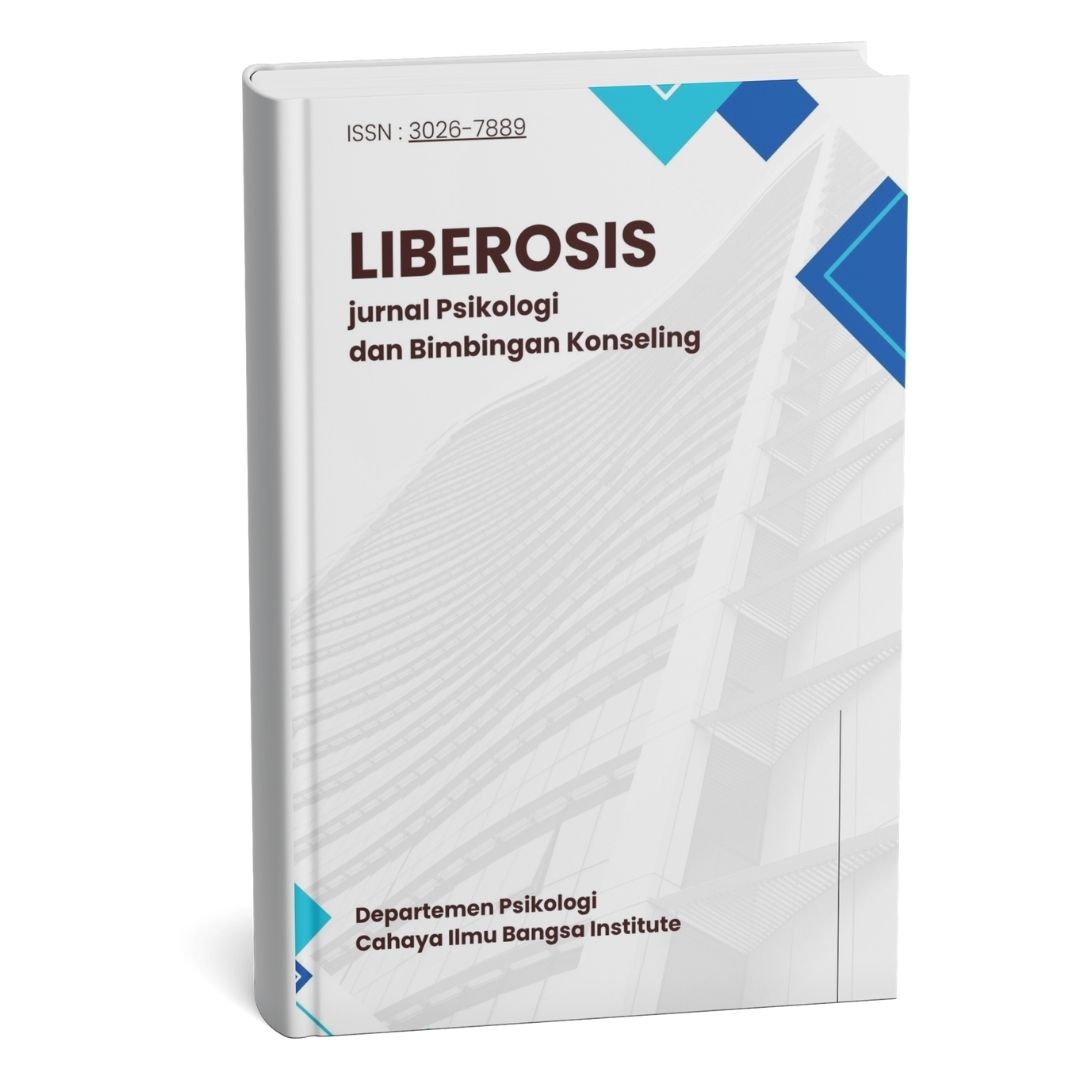HUBUNGAN ANTARA WORK LIFE BALANCE DENGAN PSYCHOLOGICAL WELL BEING PADA PEGAWAI GENERASI Z DI KECAMATAN X KABUPATEN GRESIK
Main Article Content
Abstract
Psychological well being merupakan kondisi penting bagi individu dalam mempertahankan kesehatan mental, terutama di tengah tekanan kerja di sektor formal. Pegawai Generasi Z seringkali menghadapi tantangan dalam mencapai work life balance yang dapat mempengaruhi kesejahteraan individu. Tujuan kajian untuk mengetahui hubungan antara work life balance dengan psychological well being pada pegawai Generasi Z di Kecamatan X Kabupaten Gresik. Pendekatan kuantitatif menjadi metode dalam penelitian ini dan analisis data dengan korelasi product moment. Skala psychological well being dan skala work life balance dengan penilaian skala likert sebagai instrumen penelitian. Subjek pada kajian ini sebanyak 359 pegawai Generasi Z. Hasil analisis data menunjukan nilai signifikansi pada kedua variabel yaitu 0,001 dengan koefisien korelasi sebesar 0,791. Menunjukan adanya hubungan yang kuat dan signifikan antara work life balance dan psychological well being. Hasil analisis bertanda positif, artinya apabila work life balance yang dirasakan pegawai Generasi Z tinggi, maka psychological well being akan meningkat. Sebaliknya, semakin rendah work life balance yang dirasakan, maka psychological well being cenderung menurun.
Article Details
Section
How to Cite
References
APA. (2019). Gen Z more likely to report mental health concerns. American Psychological Association..
Barhate, B., & Dirani, K. M. (2021). Career aspirations of generation Z: A systematic literature review. European Journal of Training and Development, 45(1–2), 139–157. https://doi.org/10.1108/EJTD-07-2020-0124
Berger, A. (2010). Review : Happiness At Work. Basil & Spice .
Detikedu. (2024). Studi: Mayoritas Gen Z Incar Work life balance dan Jam Kerja Fleksibel. Detikedu.https://www.detik.com/edu/detikpedia/d-7410162/studi-mayoritas-gen-z-incar-work-life-balance-dan-jam-kerja-fleksibel
Dirfa, Y. N., & Prasetya, B. E. A. (2019). Hubungan antara Work-Life Balance dengan Psychological well being pada Dosen Wanita di Perguruan Tinggi Salatiga. Jurnal Psikohumanika, 11(2), 151–169. http://dx.doi.org/10.31001/j.psi.v11i2.699
Dudija, N., & Apriliansyah, M. D. (2024). Psychological well being among Generation Z employees: A Literature Review. International Journal of Scientific Research and Management (IJSRM), 12(08), 79–87. https://doi.org/10.18535/ijsrm/v12i08.gp01
Fisher, G. G., Bulger, C. A., & Smith, C. S. (2009). Beyond Work and Family: A Measure of Work/Nonwork Interference and Enhancement. Journal of Occupational Health Psychology, 14(4), 441–456. https://doi.org/10.1037/a0016737
GoodStats. (2023). Sensus BPS: Saat Ini Indonesia Didominasi Oleh Gen Z. GoodStats. https://data.goodstats.id/statistic/sensus-bps-saat-ini-indonesia-didominasi-oleh-gen-z-n9kqv
Huppert, F. A. (2009). Psychological Well-Being : Evidence Regarding its Causes and Consequences. Applied Psychological : Health and WellBeing, 1–28. https://psycnet.apa.org/doi/10.1111/j.1758-0854.2009.01008
John, I., Anthony, N. K., & Bakari, D. Y. (2020). Impact of Work life balance on the Psychological well being of Employees in the University of Cape Coast. Journal of Psychology & Behavioral Science 8(1), 8–19. https://doi.org/10.15640/jpbs.v8n1a2
Kamil, R., & Laksmi. (2023). Generasi Z, Pustakawan dan Vita Activa Kepustakawanan . BACA : Jurnal Dokumentasi Dan Informasi, 25–34. https://doi.org/10.55981/baca.2023.1119
Lenaini, I. (2021). Teknik pengambilan sampel purposive dan snowball sampling. Historis: Jurnal Kajian, Penelitian & Pengembangan Pendidikan Sejarah, 6(1), 33–39. https://doi.org/10.31764/historis.v6i1.4075
Mardlotillah, I. A. M., & Fahmawati, Z. N. (2023). Work life balance and Psychological well being in Company Employees [Work life balance dan Psychological well being pada Karyawan Perusahaan]. UMSIDA Preprints Server, 1–9. https://doi.org/10.21070/ups.2834
Nurendra, A. M., & Saraswati, M. P. (2016). Model peranan work life balance, stres kerja dan kepuasan kerja pada karyawan. Humanitas: Indonesian Psychological Journal, 13(2), 84–93. https://doi.org/10.26555/humanitas.v13i2.6063
Prasad, K. D. V. (2022). Effect of occupational stress on work-life balance and psychological well being. International Journal of Health Sciences, 6(S5), 3349–3373. https://doi.org/10.53730/ijhs.v6ns5.9367
Purwodianto, J. (2023, Desember 14). Legenda Kebomas Gresik, kerbau emas simbol kejayaan Giri Kedaton. detikJatim. https://www.detik.com/jatim/budaya/d-7089592/legenda-kebomas-gresik-kerbau-emas-simbol-kejayaan-giri-kedaton
Rahim, N. B., Osman, I., & Arumugam, P. V. (2020). Linking Work-Life Balance and Employee Well-Being: Do Supervisor Support and Family Support Moderate the Relationship. International Journal of Business and Society, 21(2), 588–606. http://dx.doi.org/10.33736/ijbs.3273.2020
Rahmawati, A. (2016). Pengaruh keseimbangan kehidupan kerja (work life balance) dan kepuasan kerja terhadap loyalitas guru SMK swasta di Kecamatan Cakung Jakarta Timur. Jurnal anajemen Pendidikan, 7(1), 1215-1224. https://doi.org/10.21009/jmp.v7i1.1827
Ryff, C. D. (2014). Psychological well being revisited: Advances in the science and practice of eudaimonia. Psychotherapy and Psychosomatics, 83(1), 10–28. https://doi.org/10.1159/000353263
Ryff, C. D., & Singer, B. (2008). Know Thyself and Become What You Are: A Eudaimonic Approach to Psychological well being. Journal of Happiness Studies, 9, 13-39. https://doi.org/10.1007/s10902-006-9019-0
Sari, A. W. (2022). Pengaruh Stres Kerja terhadap Kesejahteraan Psikologis: Dukungan Sosial sebagai Variabel Intervening. Jurnal Ilmu Manajemen, 10(2), 597–606. https://doi.org/ 10.26740/jim.v10n2.p597-606
Sari, M. A., & Monalisa, A. (2021). Psychological well being Karyawan: Studi Literatur. Syntax Idea, 3(1), 161–170. https://doi.org/ 10.46799/syntax-idea.v3i1.863
Satryo, M. A., Sofiah, D., & Prasetyo, Y. (2023). Psychological well being pada karyawan: Menguji peranan kepemimpinan transformasional. INNER: Journal of Psychological Research, 3(1), 88–99. https://aksiologi.org/index.php/inner/article/view/856
Schmutte, P. S., & Ryff,C.D. (1997). Personality and Well-Being: Reexamining Methods and Meanings. Journal of Personality and Social Psychology, 73(3),549-559. https://doi.org/10.1037/0022-3514.73.3.549
Silaban, H., & Margaretha, M. (2021). The Impact Work-Life Balance toward Job Satisfaction and Employee Retention: Study of Millennial Employees in Bandung City, Indonesia. International Journal of Innovation and Economic Development, 7(3), 18–26. https://doi.org/10.18775/ijied.1849-7551-7020.2015.73.2002
Situmorang, S. H., & Lutfi, M. (2014). Analisis Data untuk Riset Manajemen dan Bisnis. USU press.
Sugiyono. (2019). Metode Penelitian Kuantitatif, Kualitatif, dan R&D (Edisi ke‑2). Bandung: Alfabeta.
Utami, K. P., & Wijaya, Y. D. (2018). Hubungan dukungan sosial pasangan dengan konflik pekerjaan-keluarga pada ibu bekerja. Jurnal Psikologi, 16(1), 1–8. https://doi.org/10.22146/jpsi.28726
Utami, T. N., & Nuraini. (2016). Analisis Spiritual Value dan Stres Kerja pada Pekerja Muslim di Sektor Formal Kota Medan. Jurnal JUMANTIK, 1, 1–24. https://doi.org/ 10.30829/jumantik.v1i1.1013
Wicaksana, S. A., Suryadi, & Asrunputri, A. P. (2020). Identifikasi Dimensi-Dimensi Work-Life Balance pada Karyawan Generasi Milenial di Sektor Perbankan. Jurnal Sekretari Dan Manajemen, 4(2), 137–143. https://doi.org/ 10.31294/widyacipta.v4i2.8432
Widana, I. W., & Muliani, P. L. (2020). Uji Persyaratan Analisis. Klik Media.
Winarno, M. E. (2013). Metodologi penelitian dalam pendidikan jasmani. UM PRESS.
Yudiani, E., & Istiningtyas, L. (2022). Psychological well being and Work-Life Balance for Women Lecturers. Psikis : Jurnal Psikologi Islami, 8(1), 19–30. https://doi.org/10.19109/psikis.v8i1.6657
